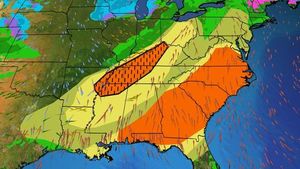In a significant response to the recent imposition of 25% tariffs by the United States on vehicles and auto parts, Mexico is preparing to negotiate preferential treatment for its automotive exports. The tariffs, announced by President Donald Trump under the guise of national security, are set to take effect on April 3, 2025. President Claudia Sheinbaum has indicated that her government will provide a comprehensive response after April 2, aiming to protect Mexico's economic interests and jobs.
During a press conference on March 27, Sheinbaum stated, "The new tariffs will impact the global automotive industry, but Mexico and Canada will have differentiated conditions thanks to the T-MEC treaty." She emphasized that automobile importers under this agreement would have the opportunity to certify their U.S. content, which would allow for a more favorable tariff structure. The president remarked, "We will always protect Mexico, the jobs generated here, and our Mexican companies," highlighting the importance of economic sovereignty.
Marcelo Ebrard, the Secretary of Economy, also addressed the situation, stating that the Mexican government is actively negotiating to secure the best possible tariff treatment for auto parts exported to the U.S. He noted, "We are at a table that has opened with the Secretary of Commerce to safeguard Mexican auto parts, which constitute 40% of the parts integrated into the entire production chain in the United States." Ebrard pointed out that while U.S. tariffs may be high, Mexico is determined to seek preferential treatment that protects jobs and economic activity.
The tariffs have drawn sharp criticism from more than 25 international automakers with plants in Mexico. These companies, which include major brands like VW, Ford, General Motors, Honda, and Hyundai, have expressed their concerns through industry associations. They assert that the tariffs threaten 30 years of regional integration facilitated by trade agreements like NAFTA and the T-MEC. In a joint statement, the associations emphasized, "The tariffs significantly harm the industry, affecting U.S. consumers, investment, and employment in all three countries."
Sheinbaum's administration is focused on ensuring that products made in Mexico are competitive against those produced in Germany, Japan, or Korea. She noted, "The more rules of origin that exports to the U.S. have, including those manufactured in Mexico, the better it will be for job creation and wealth distribution." This strategic focus aims to bolster the Mexican economy amidst growing trade tensions.
In a recent conversation with Trump, Sheinbaum succeeded in securing an agreement that products covered under the T-MEC would remain tariff-free, provided that 75% of their components originate from the U.S., Canada, or Mexico. This stipulation is crucial for maintaining the competitiveness of Mexican-made goods in the U.S. market.
However, the imposition of tariffs is expected to have immediate repercussions. Ebrard warned that the tariffs could lead to a 2.5% decline in the auto parts sector in Mexico, as well as a decrease in exports. This downturn is compounded by the fact that the tanning industry in Guanajuato is projected to experience a 35% reduction in production of leather for automotive use due to the tariffs.
Industry experts are already seeing the effects of the impending tariffs. Guillermo Malpica Soto, an investment advisor for the Mexican Council of Foreign Trade, noted that the tariffs could increase car prices in the U.S. by as much as $6,000. This price hike would not only affect consumers but also impact the overall demand for vehicles, potentially leading to a slowdown in the automotive market.
In response to these developments, the Confederation of Mexican Employers (Coparmex) has called for a diversification of exports to reduce vulnerability to such protective measures. They argue that relying on a single market poses significant risks and that strengthening the domestic market is essential.
Meanwhile, the Independent National Union of Workers of the Automotive Industry has expressed skepticism about the viability of relocating operations back to the U.S. for companies like General Motors. Secretary General Alejandra Morales Reynoso explained, "The economic and logistical challenges would be enormous. The cost of moving operations would be in the millions, and labor costs in Mexico are significantly lower than in the U.S."
As the situation unfolds, the automotive industry in Mexico is bracing for the impact of these tariffs. With up to 61.7% of vehicles exported from Puebla destined for the U.S., the stakes are high. The Audi and Volkswagen plants in Puebla have already exported over 25,000 units to the U.S. in the first two months of the year, underscoring the importance of this trade relationship.
In conclusion, the looming tariffs set to take effect in April have prompted a unified response from the Mexican government and automotive industry. With negotiations underway to secure preferential treatment and protect jobs, the outcome of this situation will have lasting implications for North American trade relations and the automotive sector's future.





